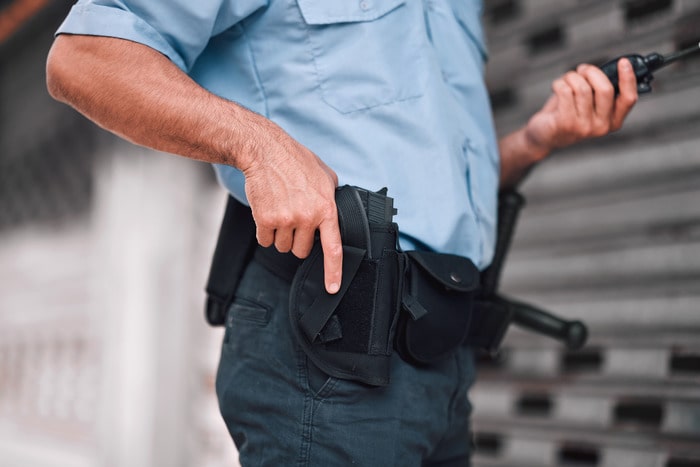Corporate Security Guard Services and the Protection of Sensitive Data: A Comprehensive Approach

In today’s digital age, the security of sensitive data has become a paramount concern for businesses worldwide. As cyber threats continue to evolve, it’s crucial for companies to adopt a holistic approach to security that encompasses both physical and digital measures. This is where corporate security guard services play a pivotal role in safeguarding a company’s most valuable assets.
The Role of Security Guards in Data Protection
While the term “security guard” may conjure images of personnel patrolling physical premises, their role has expanded significantly in the digital era. Modern corporate security guards are not only responsible for preventing unauthorized access to physical locations but also play a critical part in enforcing policies that protect sensitive data. This includes monitoring access to secure areas where data is stored, ensuring that only authorized personnel can access certain files, and even overseeing the disposal of sensitive documents to prevent data leaks.
Integrating Physical and Digital Security Measures
A comprehensive approach to data protection involves integrating physical security measures with digital cybersecurity strategies. Security guards can serve as the first line of defense by controlling access to the premises and reporting any suspicious activities that could indicate a potential cyber threat. Meanwhile, cybersecurity teams can focus on fortifying digital defenses, such as firewalls, encryption, and intrusion detection systems.
Training and Awareness
Training is a critical component of effective security. Corporate security guards must be equipped with the knowledge and skills to recognize and respond to various security threats, including those related to data protection. Regular training sessions on the latest security protocols and emerging threats can help keep the security team vigilant and prepared.
Collaboration and Communication
Effective communication and collaboration between security personnel, IT teams, and other departments are essential for a cohesive security strategy. Security guards should be briefed on the importance of protecting sensitive data and how their role aligns with the company’s overall cybersecurity objectives. Similarly, IT teams should keep the security staff informed about potential digital threats and any changes in security protocols.
Conclusion
Protecting sensitive data in the corporate world requires a comprehensive approach that combines physical security measures with advanced cybersecurity practices. Corporate security guard services play a crucial role in this integrated strategy, acting as the physical guardians of a company’s valuable information assets. By fostering collaboration, communication, and continuous training, businesses can ensure that their security teams are well-equipped to face the challenges of modern data protection.
FAQs: Corporate Security Guard Services and the Protection of Sensitive Data
Q1: How do security guards contribute to the protection of sensitive data?
A1: Security guards play a vital role in protecting sensitive data by controlling access to physical locations where data is stored, monitoring for suspicious activities, enforcing data protection policies, and ensuring that only authorized personnel access secure areas.
Q2: What is the importance of integrating physical and digital security measures?
A2: Integrating physical and digital security measures is crucial because it provides a comprehensive defense against a wide range of threats. Physical security guards can prevent unauthorized access to premises, while digital security measures protect against cyber threats, ensuring complete protection of sensitive data.
Q3: How often should security guards receive training on data protection?
A3: Security guards should receive regular training on data protection, ideally at least once every six months or whenever there are significant changes in security protocols or emerging threats. Continuous training helps keep them updated on the latest security practices and aware of the evolving threat landscape.
Q4: What role does communication play in the effectiveness of security measures?
A4: Communication is essential for the effectiveness of security measures. It ensures that security guards, IT teams, and other departments are aligned in their efforts to protect sensitive data. Regular briefings, updates, and open channels of communication help in coordinating responses to potential threats and maintaining a unified security strategy.
Q5: Can security guards be involved in cybersecurity measures?
A5: While security guards primarily focus on physical security, they can play a supportive role in cybersecurity measures. This includes reporting any physical indicators of cyber threats, such as unauthorized individuals attempting to access server rooms, and adhering to protocols that prevent the physical breach of cyber defenses.
Q6: How do security guards handle the disposal of sensitive documents?
A6: Security guards ensure that sensitive documents are disposed of securely by following strict protocols, such as shredding or using secure disposal services. This prevents sensitive information from falling into the wrong hands and reduces the risk of data leaks.
Q7: What should a company look for when hiring corporate security guard services for data protection?
A7: When hiring corporate security guard services for data protection, a company should look for a reputable service provider with experience in both physical security and data protection protocols. The guards should be well-trained, possess knowledge of the latest security technologies, and have a clear understanding of the company’s specific data protection needs.




